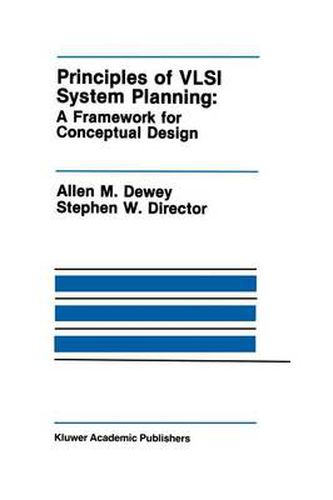Readings Newsletter
Become a Readings Member to make your shopping experience even easier.
Sign in or sign up for free!
You’re not far away from qualifying for FREE standard shipping within Australia
You’ve qualified for FREE standard shipping within Australia
The cart is loading…






This title is printed to order. This book may have been self-published. If so, we cannot guarantee the quality of the content. In the main most books will have gone through the editing process however some may not. We therefore suggest that you be aware of this before ordering this book. If in doubt check either the author or publisher’s details as we are unable to accept any returns unless they are faulty. Please contact us if you have any questions.
This book describes a new type of computer aided VLSI design tool, called a VLSI System Planning, that is meant to aid designers dur ing the early, or conceptual, state of design. During this stage of design, the objective is to define a general design plan, or approach, that is likely to result in an efficient implementation satisfying the initial specifications, or to determine that the initial specifications are not realizable. A design plan is a collection of high level design decisions. As an example, the conceptual design of digital filters involves choosing the type of algorithm to implement (e. g. , finite impulse response or infinite impulse response), the type of polyno mial approximation (e. g. , Equiripple or Chebyshev), the fabrication technology (e. g. , CMOS or BiCMOS), and so on. Once a particu lar design plan is chosen, the detailed design phase can begin. It is during this phase that various synthesis, simulation, layout, and test activities occur to refine the conceptual design, gradually filling more detail until the design is finally realized. The principal advantage of VLSI System Planning is that the increasingly expensive resources of the detailed design process are more efficiently managed. Costly redesigns are minimized because the detailed design process is guided by a more credible, consistent, and correct design plan.
$9.00 standard shipping within Australia
FREE standard shipping within Australia for orders over $100.00
Express & International shipping calculated at checkout
This title is printed to order. This book may have been self-published. If so, we cannot guarantee the quality of the content. In the main most books will have gone through the editing process however some may not. We therefore suggest that you be aware of this before ordering this book. If in doubt check either the author or publisher’s details as we are unable to accept any returns unless they are faulty. Please contact us if you have any questions.
This book describes a new type of computer aided VLSI design tool, called a VLSI System Planning, that is meant to aid designers dur ing the early, or conceptual, state of design. During this stage of design, the objective is to define a general design plan, or approach, that is likely to result in an efficient implementation satisfying the initial specifications, or to determine that the initial specifications are not realizable. A design plan is a collection of high level design decisions. As an example, the conceptual design of digital filters involves choosing the type of algorithm to implement (e. g. , finite impulse response or infinite impulse response), the type of polyno mial approximation (e. g. , Equiripple or Chebyshev), the fabrication technology (e. g. , CMOS or BiCMOS), and so on. Once a particu lar design plan is chosen, the detailed design phase can begin. It is during this phase that various synthesis, simulation, layout, and test activities occur to refine the conceptual design, gradually filling more detail until the design is finally realized. The principal advantage of VLSI System Planning is that the increasingly expensive resources of the detailed design process are more efficiently managed. Costly redesigns are minimized because the detailed design process is guided by a more credible, consistent, and correct design plan.